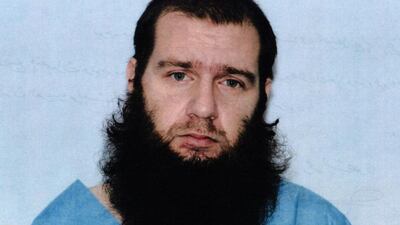The Dubai-based father of a terrorist convicted in a New York court has defended his son, claiming Muhanad Mahmoud Al Farekh is innocent and was tortured in Pakistani custody before being handed to US agents.
Farekh faces up to life in prison when he is sentenced in January. Last week a jury found him guilty on nine counts, including plotting to kill Americans, handling explosives and providing material support to al-Qaeda.
The evidence against him included fingerprints found on a massive car bomb that failed to explode when it was driven up to a US army base in Afghanistan in 2009.
His father travelled to New York for the trial in the hope of getting a chance to visit his son but created a moment of drama, briefly halting proceedings when he spoke to four jurors raising the possibility of a mistrial.
_______________
Read more:
Al Qaeda terrorist convicted for role in US army base attack
Radical sermons set American on course to join al-Qaeda, say prosecutors
_______________
Speaking for the first time after the guilty verdict, Dr Farekh, 66, told The National the prosecution had failed to show his son was guilty and had never explained what happened during his time in Pakistani custody.
“I really believe he cannot kill,” he said.
Farekh was born in Houston to Jordanian parents and grew up in Dubai, where his father said he attended the Emirates International School.
He was detained by Pakistani security forces in 2014, seven years after suddenly leaving his studies in Manitoba, Canada.
Dr Farekh said he had visited his son in Pakistan in 2007 when he showed no sign of terrorist activities.
“Maybe he was teaching, maybe he was treating the ill, maybe he was distributing money, I can believe that,” he said. “But to kill is not his personality.”
Instead he said the prosecution had exaggerated the impact of sermons by radical Islamic propagandists, such as Anwar al-Awlaki.
“A radical does not need to listen to radio or video to be radicalised,” he said. “It is something already in their minds. Seeing a video doesn’t turn you into something that you aren’t already.”
And he said no-one had explained how his son had been captured or how he had been treated in Pakistani custody before being turned over to the Americans.
He added that he believed his son had been subject to torture during his time in Pakistan, a country with a notoriously harsh attitude towards terror suspects, and that his fingerprints and other bits of forensic evidence could have been collected during this period.
“It worries me very much,” he said. “And the Americans have not done anything to investigate it.”
The defence argued that prosecutors had failed to provide evidence of Farekh's movements after 2007 and that their case was constructed only after he had been detained in Pakistan.
Dr Farekh brought the trial close to collapse last week when he approached four jurors in a lift as they left the courthouse in Brooklyn to complain that he had been unable to see his son.
Defence lawyers said his comments were likely to influence the jury, possibly corroborating the prosecution’s timeline of events, and indicated that they wanted a mistrial declared.
In the event, the judge ordered the four jurors to be dismissed – replaced with the three remaining alternates - and the jury continued its deliberations with 11 members instead of the usual 12. They took a little over 24 hours to reach their verdict.
Dr Farekh said he had returned to Dubai soon after and had sent a letter of apology to the judge explaining that he never intended to cause any trouble.
“I just said I want to kiss my son,” he said as he recalled the encounter in the lift. “It was frustration straight from my heart. I did not expect them to reply to me. I was just talking to myself out loud.
“I had no intention of influencing them.”
Jury tampering and obstruction of justice carry stiff sentences in the US, including up to 10 years in jail. A spokesman for the United States Attorney’s Office for the Eastern District of New York declined to discuss whether Dr Farekh would be prosecuted if he returned.
Letters presented as evidence during the case suggested Farekh had a wife and children in Pakistan.
They had been scanned and stored on a USB drive and a handwriting analyst said the script appeared to match that of the accused.
They recount how he has spent months in hiding in part because of drones patrolling the skies over North Waziristan, close to the border with Afghanistan.
In one, he asks a friend to come and visit his family.
“They haven’t really seen anyone in over six months,” he writes.
Dr Farekh said he was desperate to know more.
“Maybe I am a grandfather and I want to see my family,” he said. “By the time my son comes out maybe I will be 10 years dead.
“If they are still there in that country who is taking care of them?”

